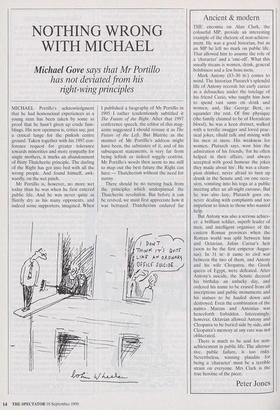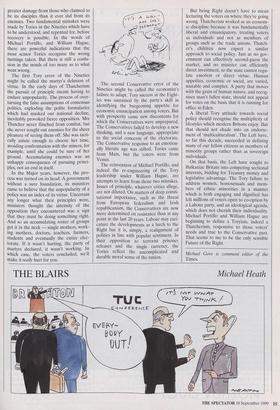NOTHING WRONG WITH MICHAEL
Michael Gave says that Mr Portillo
has not deviated from his right-wing principles
MICHAEL Portillo's acknowledgment that he had homosexual experiences as a young man has been taken by some as proof that he hasn't given up crude fum- blings. His new openness is, critics say, just a cynical lunge for the pinkish centre ground. Taken together with his 1997 con- ference request for greater tolerance towards minorities and more sympathy for single mothers, it marks an abandonment of flinty Thatcherite principle. The darling of the Right has got into bed with all the wrong people. And found himself, awk- wardly, on the wet patch.
Mr Portillo is, however, no more wet today than he was when he first entered public life. And he was never quite as flintily dry as his many opponents, and indeed some supporters, imagined. When
I published a biography of Mr Portillo in 1995 I rather tendentiously subtitled it The Future of the Right. After that 1997 conference speech, the editor of this mag- azine suggested I should reissue it as The Future of the Left. But Blairite as the manner of Mr Portillo's address might have been, the substance of it, and of his subsequent statements, is very far from being leftish or indeed soggily centrist. Mr Portillo's words then seem to me still to map out the best future the Right can have — Thatcherism without the need for nanny.
There should be no turning back from the principles which underpinned the Thatcherite revolution. But before it can be revived, we must first appreciate how it was betrayed. Thatcherism endured far
greater damage from those who claimed to be its disciples than it ever did from its enemies. Two fundamental mistakes were made by Tories in the Nineties which have to be understood, and repented for, before recovery is possible. In the words of Michael Portillo, and William Hague, there are powerful indications that the most senior Tories recognise the wrong turnings taken. But there is still a confu- sion in the minds of too many as to what went wrong.
The first Tory error of the Nineties might be called the martyr's delusion of virtue. In the early days of Thatcherism the pursuit of principle meant having to endure unpopularity. The process of over- turning the false assumptions of consensus politics, exploding the polite formularies which had masked our national decline, inevitably provoked fierce opposition. Mrs Thatcher never flinched from combat, but she never sought out enemies for the sheer pleasure of seeing them off. She was tacti- cally .astute enough to choose her time, avoiding confrontation with the miners, for example, until she could be sure of her ground. Accumulating enemies was an unhappy consequence of pursuing princi- ples, not an end in itself.
In the Major years, however, the pro- cess was turned on its head. A government without a sure foundation, its ministers came to believe that the unpopularity of a policy was an index of its virtue. Uncertain any longer what their principles were, ministers thought the intensity of the opposition they encountered was a sign that they must be doing something right. And so an accumulating roster of groups got it in the neck — single mothers, work- ing mothers, doctors, teachers, farmers, students and eventually the entire elec- torate. If it wasn't hurting, the party of martyrs declared, it wasn't working. In which case, the voters concluded, we'll make it really hurt for you. The second Conservative error of the Nineties might be called the economist's failure to adapt. Tory success in the Eight- ies was sustained by the party's skill in identifying the burgeoning appetite for economic emancipation among voters. But with prosperity came new discontents for which the Conservatives were unprepared. The Conservatives failed to develop a new thinking, and a new language, appropriate to the social concerns of the electorate. The Conservative response to an emotion- ally literate age was stilted. Tories came from Mars, but the voters were from Venus.
The reinvention of Michael Portillo, and indeed the re-engineering of the Tory leadership under William Hague, are attempts to learn from those two mistakes. Issues of principle, whatever critics allege, are not diluted. On matters of deep consti- tutional importance, such as the threat from European federalism and Irish republicanism, the Conservatives are now more determined on resistance than at any point in the last 20 years. Labour may cari- cature the developments as a lurch to the Right but it is, simply, a realignment of politics in line with popular sentiment. In their opposition to terrorist prisoner releases and the single currency, the Tories reflect the uncomplicated and durable moral sense of the nation.
But being Right doesn't have to mean lecturing the voters on where they're going wrong. Thatcherism worked as an econom- ic discipline because it was fundamentally liberal and emancipatory, treating voters as individuals and not as members of groups such as the trade unions. Thatch- er's children now expect a similar approach to social policy. Just as no gov- ernment can effectively second-guess the market, and no minister can efficiently direct investment, so the state cannot regu- late emotion or direct virtue. Human appetites, economic or social, are varied, mutable and complex. A party that moves with the grain of human nature, and recog- nises man's fallen state, should not appeal for votes on the basis that it is running for office in Eden.
A liberal Tory attitude towards social policy should recognise the multiplicity of lifestyles which modern Britons enjoy. But that should not shade into an endorse- ment of `multiculturalism'. The Left have, so far this decade, succeeded in defining many of our fellow citizens as members of minority groups rather than as sovereign individuals.
On that basis, the Left have sought to Balkanize Britain into competing sectional interests, bidding for Treasury money and legislative advantage. The Tory failure to address women, homosexuals and mem- bers of ethnic minorities in a manner which is both engaging and dignified has left millions of voters open to co-option by a Labour party, and an ideological agenda, which does not cherish their individuality. Michael Portillo and William Hague are beginning to define a Toryism, indeed a Thatcherism, responsive to those voters' needs and true to the Conservative past. That seems to me to be the only sensible Future of the Right.
Michael Gove is comment editor of the Times.



























































































 Previous page
Previous page